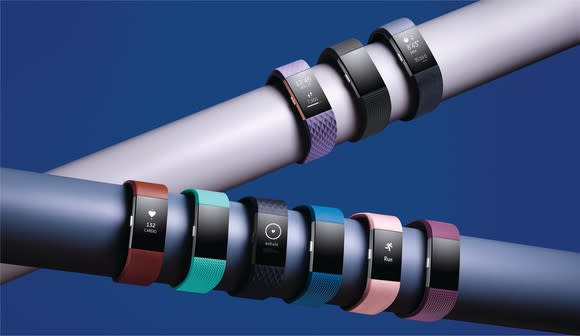Fitbit Loses Its Wearables Crown to Apple
Fitbit (NYSE: FIT) is no longer the world's top wearables maker, according to IDC's latest market share figures. That title now belongs to Apple (NASDAQ: AAPL), which grew its market share from 14.4% to 21% between the fourth quarters of 2016 and 2017.
Fitbit's share dropped from 18.5% to 14.2% during the same period. Xiaomi-backed Huami (NYSE: HMI), which had tied Fitbit for first place during the third quarter, slipped to third place for the fourth quarter as its share fell from 14.7% to 13%.

Image source: Fitbit.
Apple also ranked first for the full year with 15.3% of all shipments, up from just 10.8% in 2016. Huami ranked second, with 13.6%, as Fitbit sank to third place with a 15.4% share. That defeat caps off a dismal year for Fitbit, which trades at about a quarter of its IPO price of $20.
What happened to Fitbit?
Fitbit enjoyed a first mover's advantage in the wearables space, and its brand became synonymous with fitness trackers. However, competitors eventually entered the market with cheaper devices and more feature-rich devices, and Fitbit struggled to stand out in the saturated market.
Meanwhile, a new generation of smartwatches -- led by the Apple Watch and Android Wear devices -- threatened to render simpler fitness trackers obsolete. Improved motion sensors and fitness apps on phones could also be used to track walks or runs without a dedicated fitness tracker.

Fitbit's Charge 2. Image source: Fitbit.
Fitbit responded by expanding deeper into niche markets. It launched fashion-oriented devices, like the Alta, and performance-oriented devices, like the Surge and Charge, to avoid going head to head against Huami in the low-end market or Apple in the high-end market.
This tactic helped Fitbit tread water for awhile, but it realized that the market would eventually be overtaken by smartwatches. In 2016, it launched the Blaze as a cheaper alternative to the Apple Watch, but the critics bemoaned its boxy aesthetics and lack of a proper app ecosystem.
Later that year, Fitbit bought smartwatch pioneer Pebble's software assets, which it would later use as the foundation of its own app store. In early 2017, it bought high-end smartwatch start-up Vector. This culminated in the launch of its first "real" smartwatch, the Ionic, last August.

Fitbit's Ionic smartwatch. Image source: Fitbit.
Unfortunately, the Ionic wasn't the game-changing device Fitbit hoped it would be, and it was largely overshadowed by Apple's launch of the Apple Watch Series 3.
As a result, Fitbit's fourth-quarter numbers missed analyst estimates on both the top and bottom lines, and it expects a 7% revenue decline this year. It also expects its gross margins to contract throughout the year.
Will Apple keep growing?
Last quarter, Apple claimed the Series 3 saw twice the sales volume of the Series 2 in the prior year. It also stated that Apple Watch shipments and revenue had risen more than 50% year over year for four straight quarters.
Apple didn't disclose exactly how many watches it shipped, but IDC claims that its wearables shipments rose 56% to 17.7 million in 2017. Fitbit's shipments fell 32% to 15.4 million units, and the company's outlook for 2018 indicates that figure won't rebound anytime soon.
Looking ahead, Fitbit will struggle to match the stickiness of Apple's ecosystem, which could convince customers to upgrade their Apple Watches instead of trying out other wearables. Apple also tethers Siri, Apple Music, Apple Pay, Health, and other iOS apps to the Apple Watch, making it an increasingly important accessory for iPhone owners.
What's next for Fitbit?
Fitbit is trying to counter the tractor beam of Apple's ecosystem with new features like the App Gallery, Fitbit Pay, its subscription-based Fitbit Coach trainer, and the upcoming integration of Twine Health's cloud-based health platform. It's also reportedly developing a new smartwatch focused on "mass appeal," and it might eventually launch a kids' smartwatch.
Those efforts indicate that Fitbit isn't sitting still, but I still think it's too late for the company to make a comeback. Therefore, I'd stay away from Fitbit and consider other wearable plays instead.
More From The Motley Fool
Leo Sun has no position in any of the stocks mentioned. The Motley Fool owns shares of and recommends Apple and Fitbit. The Motley Fool has the following options: long January 2020 $150 calls on Apple and short January 2020 $155 calls on Apple. The Motley Fool has a disclosure policy.
